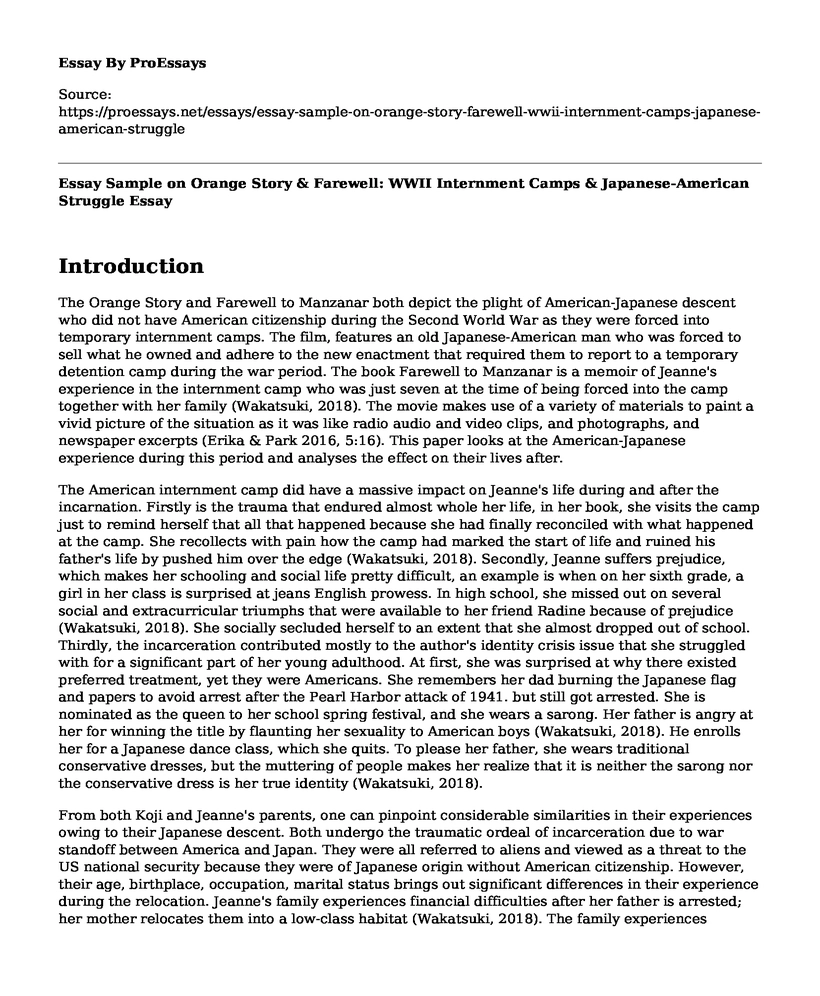Introduction
The Orange Story and Farewell to Manzanar both depict the plight of American-Japanese descent who did not have American citizenship during the Second World War as they were forced into temporary internment camps. The film, features an old Japanese-American man who was forced to sell what he owned and adhere to the new enactment that required them to report to a temporary detention camp during the war period. The book Farewell to Manzanar is a memoir of Jeanne's experience in the internment camp who was just seven at the time of being forced into the camp together with her family (Wakatsuki, 2018). The movie makes use of a variety of materials to paint a vivid picture of the situation as it was like radio audio and video clips, and photographs, and newspaper excerpts (Erika & Park 2016, 5:16). This paper looks at the American-Japanese experience during this period and analyses the effect on their lives after.
The American internment camp did have a massive impact on Jeanne's life during and after the incarnation. Firstly is the trauma that endured almost whole her life, in her book, she visits the camp just to remind herself that all that happened because she had finally reconciled with what happened at the camp. She recollects with pain how the camp had marked the start of life and ruined his father's life by pushed him over the edge (Wakatsuki, 2018). Secondly, Jeanne suffers prejudice, which makes her schooling and social life pretty difficult, an example is when on her sixth grade, a girl in her class is surprised at jeans English prowess. In high school, she missed out on several social and extracurricular triumphs that were available to her friend Radine because of prejudice (Wakatsuki, 2018). She socially secluded herself to an extent that she almost dropped out of school. Thirdly, the incarceration contributed mostly to the author's identity crisis issue that she struggled with for a significant part of her young adulthood. At first, she was surprised at why there existed preferred treatment, yet they were Americans. She remembers her dad burning the Japanese flag and papers to avoid arrest after the Pearl Harbor attack of 1941. but still got arrested. She is nominated as the queen to her school spring festival, and she wears a sarong. Her father is angry at her for winning the title by flaunting her sexuality to American boys (Wakatsuki, 2018). He enrolls her for a Japanese dance class, which she quits. To please her father, she wears traditional conservative dresses, but the muttering of people makes her realize that it is neither the sarong nor the conservative dress is her true identity (Wakatsuki, 2018).
From both Koji and Jeanne's parents, one can pinpoint considerable similarities in their experiences owing to their Japanese descent. Both undergo the traumatic ordeal of incarceration due to war standoff between America and Japan. They were all referred to aliens and viewed as a threat to the US national security because they were of Japanese origin without American citizenship. However, their age, birthplace, occupation, marital status brings out significant differences in their experience during the relocation. Jeanne's family experiences financial difficulties after her father is arrested; her mother relocates them into a low-class habitat (Wakatsuki, 2018). The family experiences disintegration during the camp period, with her dad falling into an emotional turmoil that changed him into an alcoholic and violent husband. On the other hand, Koji is an elderly American-Japanese man with no family running a local store, which he is forced to sell at a throwaway price to report to the camp. He experiences firsthand prejudice when he tries to buy an orange from his former shop, but he is told it goes for a higher amount than the one stated because he is of a Japanese origin.
Conclusion
Conclusively, the two stories could be extrapolated to show the experience of the majority of American-Japanese citizens. Despite being in place for just a couple of years, Executive Order 9066 impact on American-Japanese was immense and left memories and emotional scars that will take several generations to heal completely. Arguably, The incident was both a violation of fundamental human rights and a contradiction of the US notional tenets.
Reference
Erika S. & Park, E. (2016). The Orange Story. Chicago Film Makers.
Wakatsuki, J. (2018). Farewell to Manzanar. Houghton Mifflin Harcourt.
Cite this page
Essay Sample on Orange Story & Farewell: WWII Internment Camps & Japanese-American Struggle. (2023, May 02). Retrieved from https://proessays.net/essays/essay-sample-on-orange-story-farewell-wwii-internment-camps-japanese-american-struggle
If you are the original author of this essay and no longer wish to have it published on the ProEssays website, please click below to request its removal:
- Why the Provision of Both 1820 and 1850 Didn't Stop the Civil War
- Essay Sample on the Cherokees Removal
- Film Analysis Essay on Twelve Years a Slave
- Paper Example on 9/11 Attack on The World Trade Centre And the Pentagon
- The Islamic State - Paper Example
- Truth Telling and Commissions During a Time of War Essay
- Essay Example on the Cold War: A Conflict Between Two Superpowers







